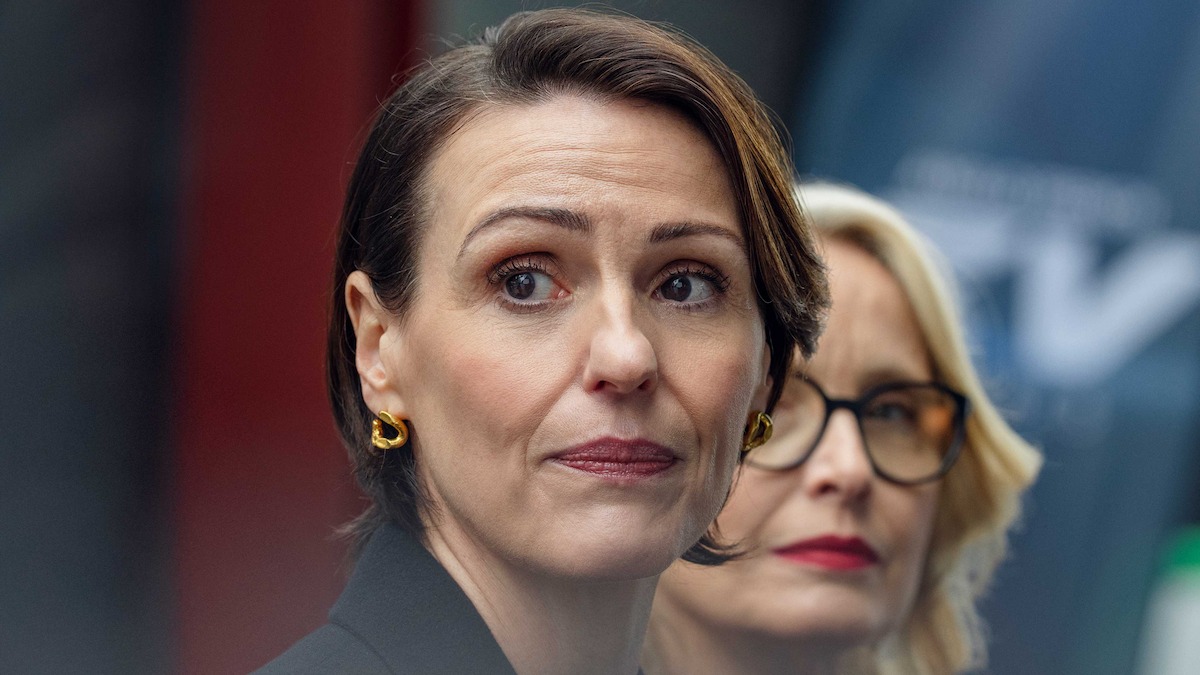
Netflix’s Hostage Season 1, released in August 2025, arrived with high expectations and a powerhouse cast led by Suranne Jones and Julie Delpy. Billed as a taut political thriller, the series promised to blend high-stakes diplomacy, personal sacrifice, and moral ambiguity into a binge-worthy package. While it delivers on tension and polish, critical and audience reactions suggest a more nuanced reality—one where style often overshadows substance.
Here’s a comprehensive look at how Hostage Season 1 has been received, what critics are saying, and how viewers are responding to its themes, performances, and storytelling.
The Premise: Power, Pressure, and Personal Cost
Set against the backdrop of a fictional UK government crisis, Hostage centers on Prime Minister Abigail Dalton (Suranne Jones), whose husband is kidnapped during a high-profile diplomatic visit from French President Vivienne Toussaint (Julie Delpy). As the two leaders navigate escalating threats, political fallout, and personal dilemmas, the series explores the tension between public duty and private loyalty.
The show’s central question—how far will powerful women go to protect what they love while holding onto their hard-won influence—anchors the narrative. With a British shortage of critical cancer drugs and international pressure mounting, the stakes are both intimate and geopolitical.
Critical Reception: A Mixed Bag of Praise and Frustration
Critics have been divided in their assessment of Hostage. On one hand, the series has been praised for its sleek production values, compelling performances, and timely themes. On the other, it’s been criticized for a storyline that veers into implausibility and fails to fully explore its provocative premise.
The Independent called the show “chic” and applauded the casting of Jones and Delpy as “formidable world leaders.” However, it lamented the series’ tendency to chase “jump-the-shark plot points” instead of grappling with the deeper questions it raises. The review pointed out that while the show sets up a compelling moral dilemma, it often opts for dramatic twists over emotional or political nuance.
Radio Times echoed this sentiment, describing Hostage as “fine binge-watch material, but quite forgettable.” The review noted that the series is short and snappy—just five episodes—and structured to keep viewers hooked with cliffhangers. Yet, it criticized the lack of character depth, particularly in Abigail Dalton’s portrayal. Despite glimpses into her personal life, including a strained relationship with her father, the show doesn’t delve deeply enough into her motivations or internal conflicts.
Audience Reactions: Engaged but Unsatisfied
Viewer responses have been similarly mixed. Many praised the show’s pacing and accessibility, noting that it’s perfect for a weekend binge. The hostage plot, combined with political intrigue, keeps the tension high, and the performances—especially from Suranne Jones—are widely appreciated.
However, some viewers expressed disappointment with the predictability of the twists and the lack of emotional payoff. While the show teases complex ethical questions—such as whether a leader should prioritize family over national duty—it rarely follows through with meaningful exploration. Instead, it leans on genre tropes and dramatic reveals that feel more mechanical than organic.
Social media buzz has highlighted the show’s strengths in casting and production design, but also pointed out its shortcomings in writing and character development. The general consensus: Hostage is entertaining, but not groundbreaking.
Performances: Suranne Jones Shines, Julie Delpy Adds Gravitas
Suranne Jones, known for her roles in Doctor Foster, Gentleman Jack, and Vigil, delivers a commanding performance as Prime Minister Abigail Dalton. She balances vulnerability and authority with finesse, making her character’s dilemmas feel grounded even when the plot stretches credibility.
Julie Delpy, as French President Vivienne Toussaint, brings elegance and intensity to the role. Her scenes with Jones are among the show’s highlights, offering glimpses of power dynamics, mutual respect, and subtle rivalry. The chemistry between the two leads elevates the material and adds emotional weight to the political drama.
Supporting performances from Ashley Thomas (as Abigail’s husband Dr. Alex Anderson), Lucian Msamati, and Corey Mylchreest round out the ensemble, though their characters often feel underwritten. The show’s focus remains tightly on the two female leads, which is both a strength and a limitation.
Themes: Timely but Underdeveloped
Hostage touches on several timely issues—healthcare shortages, international diplomacy, gendered leadership, and the personal cost of public service. These themes resonate in today’s political climate and offer fertile ground for storytelling.
Yet, critics argue that the show doesn’t dig deep enough. The ethical dilemmas are introduced but not interrogated. The political backdrop feels more like a set piece than a lived reality. And while the show gestures toward feminist commentary, it rarely challenges or complicates its portrayal of women in power.
In short, Hostage raises important questions but often leaves them unanswered.
Direction and Writing: Slick but Safe
Created by Matt Charman, Hostage benefits from tight direction and a polished aesthetic. The pacing is brisk, the cinematography crisp, and the production design suitably high-stakes. Each episode ends on a cliffhanger, keeping viewers engaged and eager for the next installment.
However, the writing has been a point of contention. While the dialogue is serviceable and the plot moves efficiently, the series avoids taking narrative risks. The twists are predictable for seasoned thriller fans, and the emotional arcs feel rushed. There’s a sense that the show is more concerned with being watchable than memorable.
Final Verdict: Worth Watching, But Don’t Expect Depth
Hostage Season 1 is a stylish, fast-paced political thriller that delivers surface-level entertainment with flashes of brilliance. Suranne Jones and Julie Delpy anchor the series with strong performances, and the premise is compelling enough to sustain interest across five episodes.
But for viewers seeking a deeper exploration of power, morality, and personal sacrifice, the show may fall short. It’s a solid weekend binge—perfect for fans of political drama and high-stakes thrillers—but unlikely to spark lasting conversation or critical acclaim.
As Netflix continues to expand its international slate, Hostage stands as a reminder that even with star power and sleek production, storytelling remains king. Here’s hoping Season 2, if greenlit, dares to dig deeper.


Leave a Reply